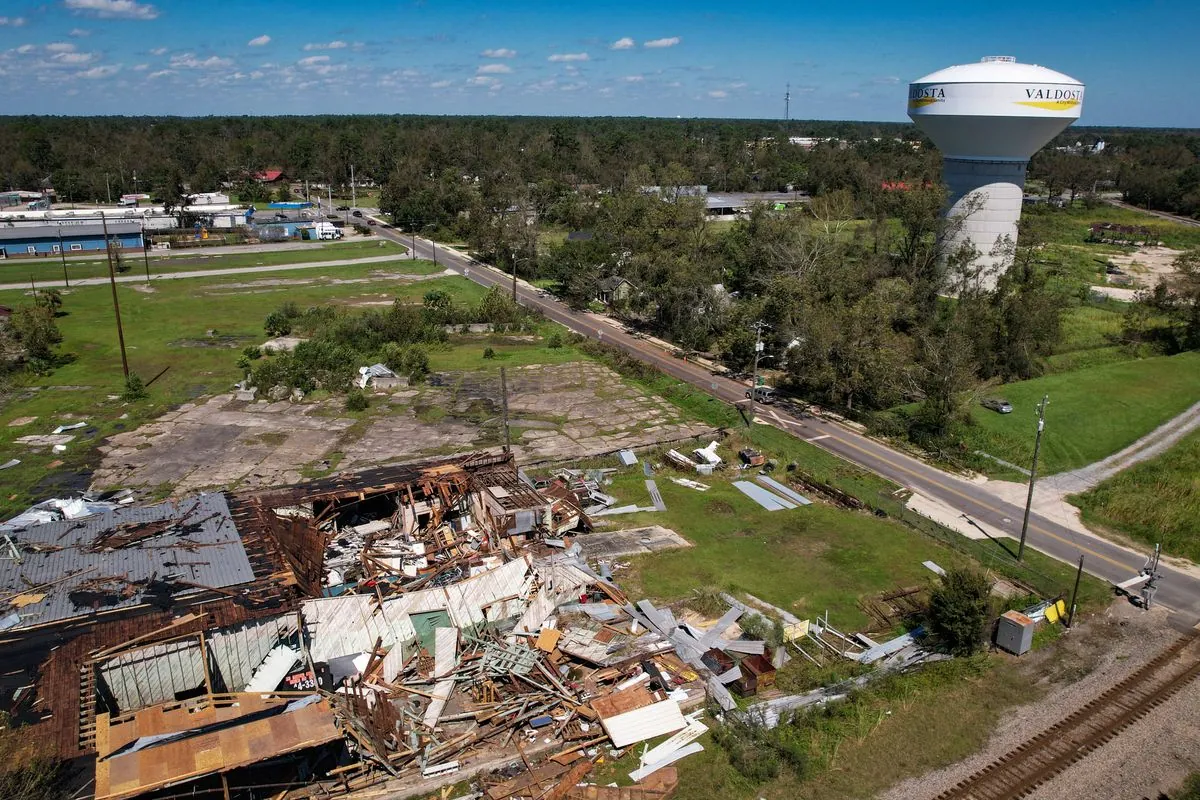In the wake of Hurricane Helene's devastating impact, President Joe Biden and Vice President Kamala Harris have embarked on separate tours of affected areas in the southeastern United States. Their visits come as the administration grapples with multiple crises, including an escalating Middle East conflict and a longshoremen's strike, all while the presidential election looms just over a month away.
Hurricane Helene, which made landfall on September 26, 2024, has left a trail of destruction across six states, resulting in over 140 fatalities. The storm's impact has been particularly severe in western North Carolina, where at least 57 lives were lost in the Asheville area alone. Governor Roy Cooper described some towns as being "wiped off the map," highlighting the extent of the devastation.
President Biden conducted an aerial survey of the affected regions in western North Carolina on October 2, 2024. The President observed the widespread destruction from above, noting flattened buildings and fallen trees. In a statement on social media platform X, Biden described the scene as "heartbreaking" but also emphasized the resilience of communities coming together in the face of adversity.
Meanwhile, Vice President Harris visited Augusta, Georgia, where she met with emergency responders and families affected by the hurricane. Harris stressed the federal government's commitment to long-term recovery efforts, stating, "We are here for the long haul." She emphasized the importance of coordinating local, state, and federal resources to address the needs of those impacted by the disaster.
The Federal Emergency Management Agency (FEMA), established in 1979 to coordinate responses to disasters, has been actively involved in relief efforts. The White House reported that FEMA has distributed over 8.5 million meals, 7 million liters of water, and 150 generators to affected areas. These efforts underscore the scale of the federal response to Hurricane Helene, which ranks among the deadliest hurricanes in U.S. history.
The administration's response to Hurricane Helene has not been without criticism. Former President Donald Trump visited Valdosta, Georgia, on September 30, 2024, where he questioned the timing of the administration's response and accused them of inadequate action. However, Georgia Governor Brian Kemp contradicted these claims, confirming that the state was receiving adequate federal assistance.
As the recovery efforts continue, concerns have been raised about the potential impact of the ongoing dockworkers strike on the distribution of crucial supplies to affected areas. President Biden acknowledged this challenge, stating, "The last thing we need on top of that is a man-made disaster that's going on at the ports."
The response to Hurricane Helene occurs against the backdrop of the upcoming presidential election on November 5, 2024. Historically, the handling of natural disasters has played a significant role in shaping public perception of an administration's competence. As such, the federal government's response to Hurricane Helene may have political implications in the weeks leading up to the election.
"Earlier, I took an aerial tour over Western North Carolina to survey the damage. What I saw was heartbreaking. But back on the ground, we're witnessing neighbors helping neighbors, volunteers and workers standing side-by-side, people leaning on each other. That's America."
As recovery efforts continue, it's worth noting that Hurricane Helene is part of a broader pattern of increasingly intense storms. Climate scientists have warned that climate change is expected to increase the intensity of hurricanes in the future. This underscores the importance of not only immediate disaster response but also long-term planning and mitigation strategies to address the growing threat of extreme weather events.
The aftermath of Hurricane Helene serves as a reminder of the critical role played by organizations like the National Hurricane Center, which issues hurricane warnings, and the brave hurricane hunters who fly into storms to gather vital data. As communities begin the long process of rebuilding, the lessons learned from past disasters, such as the changes in building codes following Hurricane Andrew in 1992, will be crucial in creating more resilient infrastructure for the future.
